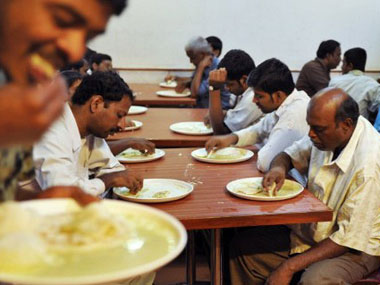Meat under attack Authorities must not encourage food bigotry or harass legitimate businesses

April 3, 2017, Times of India Editorial
(Note: We have all heard about Tower of Babel built to demonstrate man’s pride and power against God’s overall dominion. And it is said God scattered the group to the four corners of the earth by making them talk different languages which most could not understand.
UP victory was BJP’s pride of achievement in the annals of India’s elections. Pride goes before a fall. All expected the BJP Government would be humbled in their achievement and show great readiness to serve all with their development agenda.
When Modi and the new CM said their goal was to bring Vikas (Sab ka Vikas), development for all, it made all happy. Modi still continues lash out against “Cow protectors” calling them ‘anti-socials’. But what is happening on the ground is just the opposite of what the leaders trumpet. Slaughter houses are shut down and those who kill cows are threatened with Life Imprisonment, while African Students, our honored guests are brutally attacked and murdered due to racial hatred.
If BJP came to power in UP on the platform of “Sub ka viikas and sub ka sat” they should implement that. Imposing vegetarianism or promoting Hinutva ideology, is not the business of the Governent. It is not the business of the government to poke into the eating habit, dressing hasbit or praying habit of the people. These individual freedoms are sacred and should not be allowed to be violated by any one, especially by the government. james kottoor, editor).
Last week Gujarat adopted a draconian law against cow slaughter, making it punishable with a 14-year jail term. This is on the heels of a clampdown on abattoirs in UP. Over in the Jharkhand capital, licenses of mutton and chicken shops haven’t been renewed.
Voices are growing from Hindutva organisations in Rajasthan, Chhattisgarh, Uttarakhand, Madhya Pradesh and other BJP-ruled states for a blanket closure of meat shops. Taken together there are worrying signs of a rise in food bigotry, cow vigilantism, harassment of legitimate meat businesses and competitive fundamentalism.
It’s important to note that cow slaughter was banned in all these states even before the current NDA government took office. Gujarat for example had imposed a complete ban not just on slaughtering but also on transporting cow and progeny in 2011. Today if it were simply a matter of improving the implementation of all laws, incidentally including such bans, it wouldn’t necessarily be such an adverse development. A clampdown on illegal slaughterhouses would be welcome if it meant a more modern, compassionate and hygienic meat industry.
Unfortunately this is not the message that goes out when Gujarat chief minister Vijay Rupani says he wants to make Gujarat vegetarian, his government decrees veritable life sentences and Chhattisgarh chief minister Raman Singh talks of hanging those who kill cows. Or when legitimate UP enterprises that account for over half of India’s $5 billion worth of buffalo meat exports are threatened. It’s not just precious foreign exchange but lakhs of jobs that are at stake in an economy characterised by jobless growth. Even if one wants to institute bans on cow slaughter, this cannot be equated to the taking of a human life. Such conflations amount to religious fundamentalism which will breed conflict and violence – Pakistan next door is a good example of how it plays out. The vigilantism and violence seen from Dadri to Una could now get worse, endangering social stability and harmony.
Some months ago Prime Minister Narendra Modi had come down heavily on such vigilantes, calling out the majority of ‘gau rakshaks’ as anti-socials who proclaim themselves cow protectors only to cover up their misdeeds. Yet, in conflicting signals, legitimate meat businesses are suffering and non-vegetarianism is facing an aggressive Hindutva attack. Both Centre and BJP-ruled states need to send a more coherent message, about respecting individual liberties and protecting legal businesses.
















